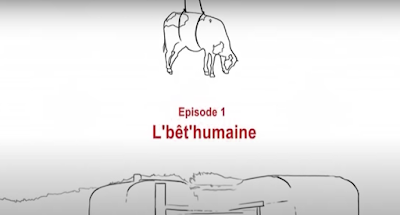The world's a stage. Leos Carax himself appears in Holy Motors in a more-than-Hitchcockian cameo as he enters a door in a wall made to look like trees and we find ourselves in a movie theatre: from the beginning the illusion of reality is broken, appearance is revealed as a sham, as it will again and again with the Chinese boxes of this film which on occasion refers to other films, as indeed it refers to itself as a film.
And at the beginning we also see a few moving shots by the inventor of chronophotography, Etienne-Jules Marey, from which we see the recreation of movement. Brought up to present day, this film – and film of course is playing with reality – shows Mr Oscar (Denis Levant) playing with reality by acting out ten other characters, changing into them in a huge stretch limo which has a changing room and is driven by his chauffeuse Céline (Édith Scob), who sometimes announces to him when it's time to play his next role, for which Mr Oscar appears to be commissioned. The back of the limo serves as his dressing room, where he changes costumes, changes makeup, changes his age and on the second occasion superficially changes his sex. The titles I give him are taken from the beginning of the credit list at the end of the film, and are in chronological order:
Le Banquier. Not needing to change clothes as he talks on the phone, Mr Oscar (another reference to films) talks about bank details as Céline drives him to his second 'rendez-vous'.
La Mendiante. This is where Mr Oscar begs on the Pont Alexandre III dressed as a Romani beggar woman with a shawl round him.
L'O.S. de la Motion Capture. O.S. is an abbreviation of 'ouvrier spécialisé', and here we see Mr Oscar cavort, is dance the right word?, and join with a female in a vaguely sexual way.
M. Merde. Monsieur Merde, the one-eyed anarchist – already met in Carax's contribution to Tokyo ! (2008) – inhabits the sewer and comes out to eats flowers and pester people, such as when he causes havoc to a film shoot in Père Lachaise. Interest is shown in incorporating Merde into the shoot, but he kidnaps Kay (Eve Mendes) and takes her into the sewers with him, although she seems completely unconcerned, indicating that she knows this is just a film. And, contrary to expectations, Merde covers her up as a Muslim woman (even the face, apart from the eyes), strips naked with an improbable permanent erection but does nothing.
L'Accordéoniste. Mr Oscar leads as accordionist in a church, followed by a number of other players.
Le Pére. Mr Oscar is a father talking to his daughter Angéle (Jeanne Disson), who's just been to a party. Kylie Minogue is heard singing 'Can't Get You Out of My Head' in the background. Angéle says she's had a great evening at first, although she's lying (like films are lying, like, oh...) and has just spent the time in the bathroom, and Mr Oscar rebukes her lack of confidence and tells her she'll have to live with herself as punishment.
Le Tueur. For reasons unknown, Mr Oscar is called upon to kill Théo. He visits the warehouse where he is and cuts him in the jugualar with a knife and then proceeds to make Théo look like just like he looks. But while he's doing this Théo partly revives and stabs Mr Oscar in the same way, and then dies. Mr Oscar too is obviously dying and staggers towards the limo, but Céline drags him there and he recovers without a scratch to his dressing room: of course, because his knifing was an illusion that Céline wanted to prolong to the end.
Le Tué. From killer to killed (or not). After being visited by a heavily disguised Michel Piccoli (but we'll skip that one) Mr Oscar shoots dead someone much the same as himself outside Le Fouquet's, then is himself killed by the person's bodyguards. Céline interrupts and takes him back to the limo where he recovers completely.
Le Mourant. Mr Oscar is dressed as a rich, dying old man and is joined by his niece Léa (Élise Lhomeau), and in this story there's a talk of life and death similar to Jane Campion's The Portrait of a Lady, Oscar (as M Vogan) breathes his last breath, gets up, thanks Léa and goes back to the limo.
(Before his last rendez-vous/performance Mr Oscar meets a female actor (Kylie Minogue) with whom he's had a relationship, and they go up the deserted La Samaritaine, which was once a department store. Kylie – who looks perhaps a little like Patricia (Jean Seberg) in Godard's À bout de souffle – then breaks into song like Marianne (Anna Karina) in Godard's Pierrot le fou. She then, with her partner who's just joined her, jumps to her death. Mr Oscar squeals at the suicide act, rejoins the limo and moves to his final appointment. We know that the suicides were in Carax's film, but were they also intended as fantasies within the film?)
L'Homme au Foyer. Céline drops him off, gives him his money for the day, drives off and Mr Oscar rejoins his family home with his wife and two daughters. We only see him with two chimpanzees.
As an epilogue Céline takes the car back to the depot, 'Holy Motors', and puts on the same mask that she, Édith Scob (as Christiane) wore in 1960 in Georges Franju's Yeux sans visage: yes, that's not an error. And then the motors talk amongst themselves about their lot. Disneyfication?
A major film in the history of cinema.







































